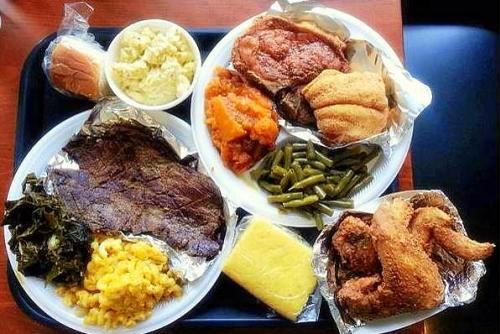Tis the Season for Soul Food
American holiday dinner favorites have a long history in the African American community.

www.fxva.com through Creative Commons
A mouthwatering display of Johnny Ray’s Sultry Food caters for Northern Virginia holiday parties.
December 16, 2021
Have you ever had sweet potato pie–that creamy, light, exotic, lovely treat? Did you know that sweet potato pie is a soul food dish from the South? For many African-Americans, Thanksgiving, Christmas, Kwanzaa, and New Year’s would be incomplete without soul food, a cuisine derived from items made and consumed by enslaved people.
Fried chicken, sweet potato pie, candied yams, sweet cornbread, ham, collards, and baked macaroni and cheese are all must-haves during the holiday season. Some of these recipes have been passed down from generation to generation, and they include not only the ingredients, but also instructions on how to blend the spices and employ a variety of cooking procedures to achieve the desired flavor.
Soul food is an ethnic cuisine traditionally prepared and eaten by African-Americans in the Southern United States. The term “soul foods” came about during the 1960s within Black culture in the South during the Civil Rights movement. And at its core, soul food is really just good home cooking that’s been passed down through many generations.
A traditional soul cuisine dinner comprises Southern deep fried chicken, greens (usually collard greens and mustard greens), and fresh baked cornbread. In the southern tradition, ham or bacon are occasionally added as well as fried okra and possibly some homemade macaroni and cheese.
During the Transatlantic Slave Trade, enslaved Africans were given low food rations. Every Saturday, the enslaved received five pounds of some starch—usually cornmeal, rice, or sweet potatoes, a couple of pounds of meat (beef, fish, or pork), and a jug of molasses. Vegetable patches, if allowed by the owner, provided fresh produce to supplement the rations. Aside from that, the enslaved had to figure out how to supplement their sustenance, thus they gardened, harvested, and fished to replenish their diet. But for many of them, it was simply eating a lot of vegetables.
With the popularity of soul food growing over the years, some may argue that they do not want to eat “the meal of the oppressor,” as soul food was created through slave master rations. But what most people don’t comprehend is that those rations are “our food,” in the sense that the slaves created something out of nothing.
In essence, all soul food is Southern, yet not all Southern foods are soul food. Although soul cuisine is unmistakably Southern, there are some distinctions. Southern cuisine is often bland and not significantly flavored. In terms of flavors and spice, soul food is more intense. Many of its dishes are saltier, spicier and some are even sweeter than specific Southern food dishes.
Thanksgiving has been and continues to be one of the most important holidays for African-American households, particularly in terms of food. But it’s not just the flavors of the cuisine that appeal to African Americans’ taste buds; it’s the specific link to Black history, hardship, and the ability to overcome, that has given African Americans a renewed respect for the meal.
Before and after slavery, it was our mommas, aunties, and sisters who put those recipes together at the table. Food has always been a part of our culture, and it is the passing down of cooking recipes from generation to generation that makes the holiday season so important in the African-American community.
Editor’s Note: This article was contributed as part of a collaboration between The Lance and Kisha Starnes’ African American History class.

Lailanie • May 17, 2023 at 2:54 pm
It’s so good! Good job Phebe!!
lucy • Dec 17, 2021 at 5:01 pm
fantastic work !
Bestie • Dec 16, 2021 at 10:50 am
Phebe you are a star
Hamster • Dec 16, 2021 at 11:44 am
You go girl!